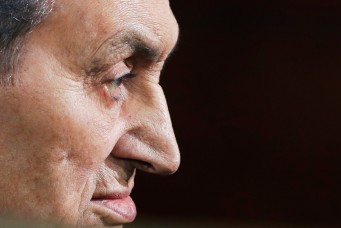The Mubarak Conviction: A Profound If Imprecise Turning Point
The conviction and life imprisonment sentences handed down Saturday to former Egyptian President Hosni Mubarak and former Interior Minister Habib Adli mark a profound but still imprecise turning point in the single most important battle that has defined the Arab world for the last two generations, and the last 60 years of uninterrupted military rule in Egypt: the contest between whether the Arab people will be ruled by democratically legitimate civilian authorities or by self-imposed and self-perpetuating military rulers.
The conviction and life imprisonment sentences handed down Saturday to former Egyptian President Hosni Mubarak and former Interior Minister Habib Adli mark a profound but still imprecise turning point in the single most important battle that has defined the Arab world for the last two generations, and the last 60 years of uninterrupted military rule in Egypt: the contest between whether the Arab people will be ruled by democratically legitimate civilian authorities or by self-imposed and self-perpetuating military rulers.
The convictions are profound because they symbolically mark a victory by those tens of millions of Egyptians — and by extension, several hundred million other Arabs — who have overthrown four regimes and seriously challenged two others in the past 18 months, demanding that their dictatorial rulers be held accountable for their brutality, corruption and abuse of power. The demonstrators who braved dangers and often died finally achieved their single most important symbolic goal, which is to put on trial, convict and jail for life Hosni Mubarak and Habib Adli. They are the most important symbols of thousands of other incumbent officials who brutalized and demeaned the Egyptian people for decades. They also personify a system of military rule that enriched a small circle of insiders, while relegating the rest of the 80 million Egyptians to a long and degrading cycle of poverty, mediocrity and marginalization.
In the last 30 years of Mubarak rule, a once proud and productive Egyptian people and nation had been pummeled by its own authoritarian military rulers into a wreck and a laughing stock. Trying, convicting and jailing these two men for life, by an indigenous Egyptian court, was probably the single most widespread and deeply felt desire among the Egyptian people in the last 18 months. It sent the message that those who abuse and degrade their own people will one day be held accountable, and that public opinion in the Arab world matters again.
On another level, however, this court case is also imprecise in its full meaning, both because of technical flaws and some powerful underlying political messages. The technical flaws relate to widespread skepticism about how the two senior leaders could be convicted in the deaths of hundreds of demonstrators while six senior police and security officers who were in charge of operational commands were found innocent and released. This captures the underlying political message that many fear is inherent in the Saturday verdicts: that the Egyptian security state will sacrifice one or two senior officials to placate popular anger, while preserving control of real power in the country by a web of military, police and intelligence agencies.
This issue becomes all the more significant because of the timing of the verdicts, two weeks before the run-off presidential election and the planned handover of power to civilian authorities by the Supreme Council of the Armed Forces (SCAF) that has governed Egypt since Mubarak’s overthrow in February 2011. One of the two presidential candidates, Ahmad Shafik, a former Air Force commander and the last prime minister under Mubarak, represents the attempt by the military-backed old guard to retain power and effectively nullify the gains of the revolution. Today’s court verdict increases fears among many Egyptians that the SCAF is shielding the operational core of the deep security state from public scrutiny and accountability, and will also work with the existing massive bureaucracy and the many security agencies to engineer a Shafik victory over the Muslim Brotherhood candidate, Mohammed Morsi.
Critics of the SCAF point out, for example, that the former Mubarak government used biased military courts to try some 2,000 critics over 30 years, while the SCAF has used the same military courts to try over 12,000 Egyptians in the last year and a half, according to estimates by human rights organizations that monitor this issue.
This is why the court verdict, while satisfying the popular need for justice and retribution against former dictators, only intensifies concerns throughout Egypt and the Arab world about whether our region can ever get rid of military rulers, and enjoy true civilian democratic rule. This remains the central battle of the Arab world today. It plays itself out in different forms across the region, in countries like Egypt, Tunisia, Syria, Yemen, Bahrain and Libya.
Two aging military rulers were convicted and jailed in Cairo this week, but the military ruling edifice remains largely in place. Hundreds of generals and colonels still contest and negotiate power with the new civilian authorities that are trying to find their footing in a country that itself is still in the early stages of redefining itself, and deciding if its government will be managed by elected civilians or more ageing generals and colonels. The great battle for the soul and identity of Egypt and the Arab world continues.
Rami G. Khouri is Editor-at-large of The Daily Star, and Director of the Issam Fares Institute for Public Policy and International Affairs at the American University of Beirut, in Beirut, Lebanon.
Copyright © 2012 Rami G. Khouri — distributed by Agence Global


